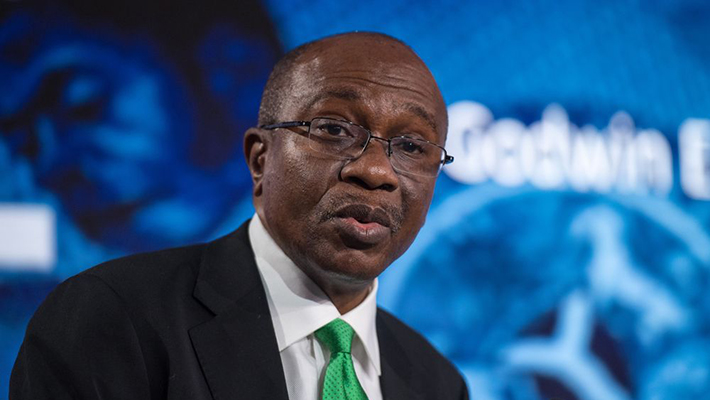Business
Against Emefiele’s claims, facts reveal NNPC remitted $2.7bn to its CBN accounts in six months
Published
2 years agoon

Against Emefiele’s claims, facts reveal NNPC remitted $2.7bn to its CBN accounts in six months
Despite claims by the Central Bank of Nigeria Governor, Mr Godwin Emefiele, that the crisis being experienced by the Naira was due to non-remittances by the Nigerian National Petroleum Company Ltd, fresh facts revealed that the national oil company actually remitted a whopping sum of $2.7bn into its account with the apex bank during the first six months of this year.
The inflow into the NNPC’s account with the CBN, according to records seen by this website, was made between January and June this year.
The CBN has in a report titled: “The forex question in Nigeria: Fact sheet”, accused the NNPC Ltd of being behind the Naira crisis in Nigeria.
Specifically, the report stated that “domestically, there has been zero-dollar remittance to the country’s foreign reserve by the NNPC.”
But investigations by this newspaper showed that out of the $2.7bn remittance into the NNPC account with the CBN, the sum of $645m was for dividend paid by the Nigerian Liquefied Natural Gas Company Ltd, while $1.786bn was remitted from the operational activities of the NNPC Ltd.
Further analysis showed that the sum of $18,770,418.97 was remitted into the NNPC account with CBN in January, while February, and March had inflows of $194, 563, 276. 49 and $373, 232,875.20 respectively.
Investigations further revealed that in the month of April, the inflow into the NNPC’s account with the apex bank was $247,884,295.52, May $591, 565, 425. 41 and June $880, 906, 761.81
Recall, this newspaper had reported how the Naira had depreciated to its lowest level in history to about N730 a dollar on the parallel market under the leadership of Emefiele as the CBN Governor.
The apex bank governor had in recent times put the blame of the declining value of the currency on different stakeholders.
For instance, in 2018, the CBN Governor said that the huge appetite of Nigerians for importation was responsible for the declining value of the Naira. He thereafter placed a ban on Forex accessibility for importation of 41 items.
In July 2021, Emefiele also hit at Bureau De Change (BDC) operators accusing them that their illegal forex trading was having a negative impact on the Naira.
In September 2021, Emefiele blamed Aboki FX for the naira depreciation the country had suffered then and threatened to arrest the brain behind the forex intelligence firm.
Early this year, the CBN governor again blamed the Naira depreciation on activities of those involved in money laundering, financing of terrorism as well as politicians.
This week, he has shifted the blame to the Nigerian National Petroluem Company Ltd.
The National Youth Council of Nigeria (NYCN) had while reacting to the latest onslaught of the CBN Governor claimed that he has been working with opposition political parties and other groups to sabotage the Nigerian economy under President Muhammadu Buhari.
The Group made the accusation in a statement issued on Sunday and signed by its President, Solomon Adodo.
In the statement which was made available to THE WHISTLER, the NYCN claimed that the poor economic management policies of the apex bank under the leadership of Emefiele was responsible for the recent free-fall of the naira.
The NYCN said in the statement that the inability of CBN to promptly release Joint Venture (JV) cash-call funding from the Treasury Single Account (TSA) even when the NNPC had adequate cash cover, had led to loss of JV Partners’ confidence to restore production and reap the benefits of today’s improved oil prices.
Adodo said in the statement that as of date, over three months dollar-denominated cash call payment amounting to over $400m properly processed are yet to be paid by CBN.
The group flayed Emefiele for completely failing to concentrate on his core mandate of price stability as a CBN Governor, pointing out that with inflation hitting about 19 per cent and the exchange rate at close to N750 to a dollar, the CBN governor has pushed more Nigerians into poverty.
The action of the CBN governor, the statement said, negates President Muhammadu Buhari’s objective to take 100 million people out of poverty.
He said, “The combined impact of CBN’s inability to promptly release JV cash-call to restore production, the increasing losses due to crude oil theft and production deferments has culminated to significant crude oil output losses of over 600, 000 barrels per day.
“At the current year-to-date average crude oil price of $107 per barrel, Nigeria is counting opportunity loses translating to over $64m per day, and a monumental impact of about $2bn per month.
“To its credit, NNPC has recorded significant gains on production ramp up including attaining ‘first oil’ production from the Anyala – Madu Fields and most recently Ikike fields which cumulatively boost national oil production by almost 80, 000 barrels per day.
“Furthermore, NNPC’s efforts towards attaining additional combined production of over 100, 000 barrels from fields like Obodo , Utapate etc has never abated despite the global setback recorded as a result of the effects of COVID-19 pandemic.”
He added, “In 2021, Emefiele blamed Aboki FX for the naira depreciation the country suffered then, it thereafter blamed members of the Association Bureau De Change, which led to the stoppage of dollar sales to the group, at another time, Emefiele blamed the naira depreciation on activities of money laundering, financing of terrorism as well as politicians.
“Today, he has shifted the blame to the NNPC. This is clearly a case of a bad workman who blames every other person for his inability to deliver.”
The Group alleged that since his failed presidential bid, Emefiele has been working with various groups in the opposition to sabotage the government .
The statement added, “To us at the NYCN, Emefiele is tired and should be relieved of his appointment.
“From all indications since his failed presidential bid as well as his rejection by the All Progressives Congress, a partisan Emefiele has been doing all to rubbish the achievements of President Muhammadu Buhari.
“There are also allegations that Emefiele has been hobnobbing with the opposition Peoples Democratic Party since his failed presidential bid.
“We are all witness to the fact that from August 2020 to July 2022, official exchange rate has moved from N381 to N415/$, representing only nine per cent increase.
“However, the parallel market has moved from N470 to N710 within the same period representing 51 per cent increase and a record 71 per cent arbitrage with the official exchange rate creating a huge incentive for round tripping, price gouging, sharp market practices and inflation.
“The NYCN is therefore shocked by the comment of the Governor associating the free-fall of the parallel market rates to NNPC, even though it is purely a monetary policy issue and outside the purview of the NNPC.
“We advise that the CBN considers among other options, the World Bank’s recommendation of adopting a single market-responsive sustainable exchange rate, improving access to forex through well-defined periodic forex auctions and signaling a renewed commitment to price stability as a primary goal of the apex bank.”
According to Adodo, Emefiele and the CBN were aware of OPEC’s reduction of Nigeria’s oil production quota which led to reduction of the country’s production level from 2.1 million barrels per day to 1.4 million in May 2020.
Furthermore, Adodo pointed out that insecurity and huge oil theft in the Niger Delta have continued to challenge the oil industry, causing massive losses and declaration of force majeure across the country’s major onshore production export facilities of Bonny, Brass and Forcados.
The NYCN president also stated that Nigeria’s rising petrol subsidy cost as well as rising cost of external debt servicing are all obligations affecting the economy.
These, it added, affected the NNPC’s remittances to the Federation Account. From January to June 2022, the cost of Premium Motor Spirit subsidy rose to N2.2trn.
Subsidy is being estimated to hit N5trn and N6trn in 2023.
“Apart from government decision to defer the implementation of PMS deregulation, the subsidy profile is significantly influenced by CBN foreign exchange management,” he added.
The NYCN president also drew the attention of Nigerians to the decision by Emirates Airlines, flag carrier of the United Arab Emirates (UAE), to reduce its flight operations to Nigeria over the inability of the CBN to repatriate about $85m in revenue.
“Was the failure to repatriate Emirates funds also caused by the NNPC,” Adodo queried.
The International Air Transport Association (IATA) had said Nigeria was withholding revenue worth about $450m earned by foreign airlines operating in the country.
Emirates said the planned reductions in its operations in Nigeria would take effect from August 15, 2022.
Adodo added, “Emirates clearly stated in that its letter to the Minister of Aviation that it made every effort to work with the CBN to find a solution to this issue and its Senior Vice-President met with the Deputy Governor of the CBN in May and followed up on the meeting by letter to the Governor himself the following month, however no positive response was received.
“The NYCN views this development as embarrassing to the federal government.”
However, the NYCN leader expressed optimism that the NNPC’s transitioning into a limited liability entity in line with the provisions of the Petroleum Industry Act (PIA) and its regulation now in line with the provisions of the Companies and Allied Matters Act (CAMA) would help resolve cash call payments delays as the company is now exempted from TSA, among others.
Also, the company would be able to compete favourably with its peers globally. This, it added, would translate to more foreign exchange to the country as well as improved national energy security.
Related
Business
Lion Oshiyemi Pledges redefinition, reposition as he emerges 20th President of OGUNCCIMA
Published
2 hours agoon
July 26, 2024
Lion Oshiyemi Pledges redefinition, reposition as he emerges 20th President of OGUNCCIMA
Lion Niyi Oshiyemi has been invested as the 20th President of the Ogun State Chambers of Commerce, Industry, Mines and Agriculture (OGUNCCIMA) at the Chamber’s 40th Annual General Meeting.
The investiture ceremony of the new OGUNCCIMA leadership was held on Thursday at Tunwase Hall in Ijebu Ode, Ogun State with top Chamber movement members in attendance.
The President In his acceptance speech, expressed gratitude to the immediate past President, Engr. Mike Akingbade, and the Chamber for entrusting him with the esteemed position.
He pledged to leverage available opportunities to redefine and reposition the Chamber, creating platforms to influence legislation and improve the business environment.
“I am honored to lead this prestigious organization and I promise to harness all available opportunities to redefine and reposition the chamber of commerce movement in the state”.
“I will continue to create platforms to influence legislation and other measures affecting trade, improve the business environment, and build a Nigerian economy of thriving business opportunities through networking”.
“I wish to enjoin you all who represent businesses, if you have not joined the OGUNCCIMA, please come and lend your voice to others. The bigger the network, the louder the voice and the stronger the influence”.
“Our advocacy seeks to ensure that the business community can have its voice heard on issues that are important to it”.
“I’d like to introduce to you my Presidency’s flagship project “OGUNCCIMA Secretariat”: The project is massive and requires a lot, I therefore seek your support and look forward to partnering with all stakeholders – the state government and it’s agencies (Federal and State Ministries, Departments and Agencies), development partners, the diplomatic communities, the media, and other stakeholders”, he said.
Oshiyemi also praised the founding fathers of the Chamber, saying, “I laud the vision of our founding fathers, who have laid a solid foundation for us to build upon. I am committed to taking OGUNCCIMA to greater heights and making it a beacon of hope for businesses in Ogun State.”
The Ogun State Hon. Commissioner for Industry, Trade and Investment, Hon. Adebola Sofela Emmanuel, in his keynote address said by the Permanent Secretary, Ministry of Trade and Investment, Dr. Olu Ola Aikulola, said over the years that the Ogun State Chambers of Commerce, Industry, Mines and Agriculture (OGUNCCIMA), has not only remained a beacon of entrepreneurial excellence, but also partners in driving economic growth, fostering trade, and promoting investment opportunities in the state.
He said: “I would like to extend my heartfelt congratulations to OGUNCCIMA on this historical movement. Forty years of dedicated service to the industrial, trade, and agricultural sectors of Ogun State is no small feat”.
“Over the years, the Ogun State Chambers of Commerce, Industry, Mines and Agriculture (OGUNCCIMA) has not only been a beacon of entrepreneurial excellence but also a pivotal partner in driving industrial growth, fostering trade, and promoting investment opportunities”.
“Today, as we elect new officers to continue this legacy of excellence, I urge all members to approach this process with a spirit of unity, fairness, and foresight. The future of our chambers and the economic well-being of our state depend on the collective wisdom and strategic vision of our leaders”.
“For us, as a government, we will continue to put in place Institutional mechanisms that will guide our various developmental programmes in all sector of the economy”, he added.
In his remarks, NACCIMA President, Dele Kelvin Oye, represented by the Director – General, Olusola Obadimu, urged the new leadership of OGUNCCIMA to reflect on the the Chambers achievements and chart the course for the future.
“Today, as we gather for the 40th Annual General Meeting and Investiture of New Executives, I want to charge the new leadership to be dedicated and build on the achievements of the past administrations”.
“On behalf of NACCIMA, I congratulate the new officers and may our shared efforts continue to bear fruit, and may new officers lead us for greater heights of success and prosperity”, he concluded.
Related
Business
ASR AFRICA FLAGS OFF CONSTRUCTION OF A N280 MILLION INTEGRATED PUBLISHING HOUSE FOR BABCOCK UNIVERSITY, ILISHAN-REMO, OGUN STATE, NIGERIA
Published
6 hours agoon
July 26, 2024
ASR AFRICA FLAGS OFF CONSTRUCTION OF A N280 MILLION INTEGRATED PUBLISHING HOUSE FOR BABCOCK UNIVERSITY, ILISHAN-REMO, OGUN STATE, NIGERIA
Sahara Weekly Reports That The Abdul Samad Rabiu Africa Initiative (ASR Africa), the philanthropic initiative of the Chairman of BUA Group, Abdul Samad Rabiu (CFR, CON), has flagged off the construction of a N280 million Abdul Samad Rabiu Integrated Publishing House for Babcock University, Ilishan-Remo, Ogun State. This project will enhance the capacity of the University from basic press status to a modern, integrated publishing house to encompass publishing, print production, and other related diversified services. The one-storey building facility will serve as a laboratory and studio for training students of communications, media studies, and allied disciplines as well as other disciplines.
At the groundbreaking event, the Vice Chancellor of the University, Prof. Ademola S. Tayo, expressed satisfaction at the nomination by ASR Africa, under its Tertiary Education Grant Scheme. He added that the choice of the project was a response to the vision to take the Mass Communications Department of the University to a whole new level. According to him, the university’s vision is to produce young men and women capable of critical thinking, and problem-solvers capable of proffering innovative solutions to problems of everyday life, be it social, political, and cultural.
In his response, Dr. Ubon Udoh, the Managing Director of ASR Africa, expressed his delight at the University’s choice of establishing an Integrated Publishing House. He added that when information is appropriately applied, human society is empowered to liberate itself from limitations and attain its full potential. Dr Udoh reiterated the commitment of the Chairman of ASR Africa, Abdul Samad Rabiu to supporting quality education within the tertiary education system in Nigeria and urged the institution to focus on the sustainability of this noble project. He also reiterated the importance of cooperation and collaboration between the university and the contractor for the timely delivery of the publishing house.
About ASR Africa
ASR Africa is the brainchild of African Industrialist, Philanthropist, and Chairman of BUA Group, Abdul Samad Rabiu, the Abdul Samad Rabiu Africa Initiative (ASR Africa) was established in 2021 to provide sustainable, impact-based, homegrown solutions to developmental issues affecting Health, Education and Social Development within Africa.
Related
Business
CBOs Laud Minister of Agric Kyari Over Transparent Distribution Of Fertilisers, Foodstuff Across Nigeria
Published
10 hours agoon
July 26, 2024
CBOs Laud Minister of Agric Kyari Over Transparent Distribution Of Fertilisers, Foodstuff Across Nigeria
A network of community-based organizations (CBOs) in Nigeria, the Coalition of Ethnic Nationalities’ Rights Agenda, the South East Revival Coalition, and Progressive Yoruba Youth for Change have applauded the Minister of Agriculture and Food Security, Sen. Abubakar Kyari, for his efforts and transparency in the distribution of food, fertilisers and other farming inputs across the country.
The CBOs gave the commendation at a joint press conference held in Abuja on Thursday. The conference was addressed by Mallam Yusuf Khalifa, National Coordinator of the Coalition of Ethnic Nationalities’ Rights Agenda; Dr. Eberechi Okonkwo, Convener of the South East Revival Coalition; and Comrade Olajide Olumide Adeniyi, Executive Secretary of Progressive Yoruba Youth for Change.
“The Minister of Agriculture and Food Security, Senator Abubakar Kyari has established a reputation for integrity and transparency in the ministry. The transparency in the distribution of food, fertilisers and other farming inputs across the country under Kyari’s stewardship is unprecedented,” the CBOs said.
“Senator Kyari has demonstrated a practical commitment to enhancing food security and nutrition in the country by prioritising equity and fairness in the distribution of food, fertilisers and other farming inputs.
“We salute his sense of nationalism. His fair distribution of farming inputs has laid a strong foundation for a prosperous and sustainable agricultural sector. Kyari’s tireless efforts to revolutionise the agricultural sector as well as to ensure that Nigeria becomes self-sufficient in food production is beyond patriotic.
“His exceptional leadership has made the the issue of marginalization in the distribution of food, fertilisers and other farming inputs, a thing of the past in the country. The effective utilization of resources by the Minister has proven not only instrumental to modernising the agricultural space but also to peace and harmony on farms across the nation.
“We applaud Senator Kyari for championing the emancipation of Nigerian farmers, particularly those in rural communities who previously lacked access to government-distributed food, fertilizers, and other farming supplies. Kyari’s unwavering support for women and youth in agriculture has resulted in increased distribution of food, fertilizers, and other farming inputs to more female and young farmers this year than ever before.
“This network of community-based organisations urges the beneficiaries, especially those in the rural communities, to use the supplies judiciously for the purpose they were distributed for. The government has prioritised the agricultural sector as a key driver of Nigeria’s economic growth, hence, its unwavering support of the sector. Farmers must corroborate the government’s efforts by taking advantage of its policies, programmes and interventions.
“We urge the Minister to sustain his visionary leadership, effective resource utilization, and strategic initiatives which have yielded significant progress in the agricultural sector.
“We remain committed to working alongside the Minister to strengthen the agricultural sector and achieve a prosperous, food-secure, and environmentally sustainable Nigeria.”
Related
Cover Of The Week

- Economic Community of West African States (ECOWAS) Centre for Renewable Energy and Energy Efficiency (ECREEE) Inaugurates Solarization of Three Hospitals in Ghana July 26, 2024
- Tunisia: Amnesty International’s Secretary General denounces rollback of human rights upon concluding four-day visit July 26, 2024
- Merck Foundation Chairman & Chief Executive Officer (CEO) meet Botswana President & First Lady to launch long term partnership to build healthcare capacity, stop infertility Stigma & Gender-based Violence (GBV) and Support girl education in Botswana July 26, 2024
- Uganda: Children’s Parliament calls for end to hunger, malnutrition July 26, 2024
- Uganda: Aleper eulogised for uniting Karamoja July 26, 2024
- Call for the 2024-2025 Fellowship for Young African Professionals July 26, 2024
- Uganda: Northern Corridor Integration Projects Drive Regional Progress July 26, 2024
- South Sudan eyes Water Convention accession for stronger water governance and development opportunities July 26, 2024
- Strengthening Fisheries Cooperation: Indonesian Ambassador Meets with Angolan Minister of Fisheries July 26, 2024
- Democratic Republic of the Congo: European Union (EU) lists nine individuals and one entity July 26, 2024
- Economic Community of West African States (ECOWAS) Centre for Renewable Energy and Energy Efficiency (ECREEE) Inaugurates Solarization of Three Hospitals in Ghana July 26, 2024
- Tunisia: Amnesty International’s Secretary General denounces rollback of human rights upon concluding four-day visit July 26, 2024
- Merck Foundation Chairman & Chief Executive Officer (CEO) meet Botswana President & First Lady to launch long term partnership to build healthcare capacity, stop infertility Stigma & Gender-based Violence (GBV) and Support girl education in Botswana July 26, 2024
- Uganda: Children’s Parliament calls for end to hunger, malnutrition July 26, 2024
- Uganda: Aleper eulogised for uniting Karamoja July 26, 2024
- Call for the 2024-2025 Fellowship for Young African Professionals July 26, 2024
- Uganda: Northern Corridor Integration Projects Drive Regional Progress July 26, 2024
Trending
-

 Business6 months ago
Business6 months agoFintech Guru, Jesam Micheal Opens Biggest Apple Store In Africa, Reveals Why
-

 Business6 months ago
Business6 months agoFintech Guru, Jesam Micheal Opens Biggest Apple Store In Lagos On Saturday (Video)
-

 celebrity radar - gossips6 months ago
celebrity radar - gossips6 months agoTop Lagos Monarch Receives Jesam Micheal, Urges Him on First AAS Solar Powered Estate Project
-

 celebrity radar - gossips6 months ago
celebrity radar - gossips6 months agoMFM WINS AGAIN AS US COURT SLAMS BLOGGER, FUNKE ASHEKUN WITH 50,000 DOLLARS FOR SLANDERING CHURCH AND DR OLUKOYA










